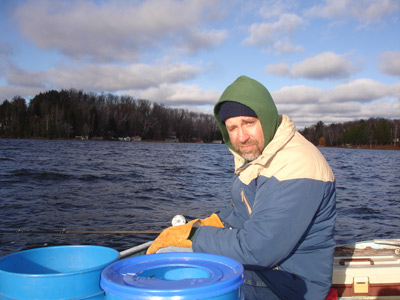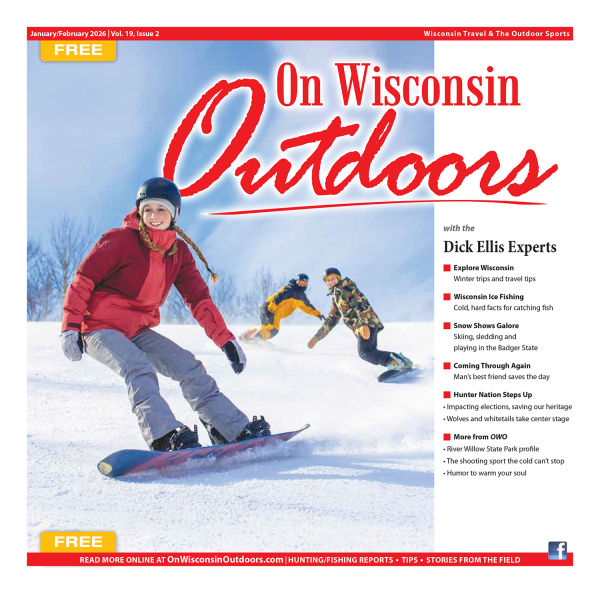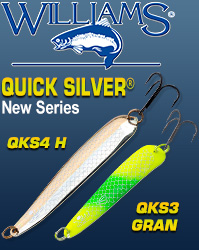FENCEROWS...Cold Musky Fever
The way that an ordinary work week degenerated so quickly into a full-blown, late-season, musky fishing pilgrimage is something you had to see to believe. I blame myself, but Tom works alongside of me, so he needs to shoulder some of the burden too.
It started Monday morning with an innocent exchange about ways to build a quick set rig that could best dangle a sucker in front of a musky. Specifics related to natural presentation, how to set the hook if a fish mouthed it, and how to pull the whole thing off in order to safely release the fish-or how to season and bake a legal musky, which may not be politically correct in some circles, but it came up, so I’m writing it down.
Tom is a fine all-around fisherman, and has done just enough musky fishing to be dangerous-mostly with top-water cranks, buck tails, and those wobbly looking lures that cost nearly as much as a down payment on a new extended cab truck and are almost as big.
Tom told me that the only time he floated a sucker for a late-season musky, he was with a hard-core musky fishing friend, and it snowed. Tom remembered the basics of the quick-set rigs they were using. He didn’t remember catching a fish, but he remembered the cold weather vividly.
My musky fishing experience was relegated to an incidental follow one warm summer afternoon while fly-fishing for bass from the shoreline. It was a big, nasty fly, and it was a big, nasty fish that pounded out of the weeds to take a look at it. That was all of the musky fishing I had under my belt. But I’d just read Dennis Radloff’s article on musky quick set rigs in the new OWO paper, so I did bring something to the discussion table.
By Tuesday morning, Tom and I had pretty much worked out what was needed, but it was still in the hypothetical stages. We were contentedly working at our jobs, until someone brought in pictures of some nice bucks, so we got a little distracted by that.
Another co-worker brought in an old bamboo fly rod for show-and-tell. It was a four-piece wonder that his grandpa had given him, and we debated the merits of bamboo versus graphite, reminiscing about fishing trips gone by. Then this same co-worker whipped out musky pictures from some of his past trips, and work started to slowly back-slide.
If it sounds like I’m making this up, I’m not. Ask Tom, ask my boss even, and they’ll tell you that we work in an environment where the outdoor lifestyle is a constant threat to productivity. To top the day off, the boss himself brought in a dish of delicious baked partridge that he procured from his annual hunting expedition in the grouse woods. Tom and I started getting that far-off stare.
When the hot blade of a finely-honed workplace grinds into cold musky fever, it can be a bit unnerving, but there’s nothing to really be done about it after it happens. Tom and I filled out our time-off paperwork and piled it onto the boss’s desk, and we were on the road and headed to a northern musky lake before the ink dried.
Remnants of the hurricane storm that devastated the East Coast tailed into Wisconsin as we headed north out of Appleton. The wind broke the clouds into ragged edges and the moon came out and rode high over Shawano Lake. There were whitecaps on the water as we passed and drove further through the small villages of Mountain and Lakewood on the way to Tom’s place.
Back in the recesses of the Nicolet National Forest, where Tom and his wife live in a cabin perched over a small lake, the treetops were shaking in the wind. We got onto the beginning of the rutted driveway fine before coming upon a giant hemlock that blew down in the storm. It had just missed the cabin drive, instead falling and blocking a neighbor’s hunting shack and boathouse access lane.
“I don’t know how that tree missed your drive,” I told Tom. “That was pretty lucky”
“Not really,” said Tom. “We need to borrow the neighbor’s boat for musky fishing tomorrow, and the boat is down that hill past the dead fall.”- The point being, that come morning we chain-sawed our way down to the boat. Tom did, anyway. Me and chainsaws don’t get along so well. I’ve still got the scar on my leg to prove it.
The boat was worth the trouble too. It was a 12 foot aluminum job, with high sides and a wooden transom that we could hook an electric trolling motor onto. I was told that the boat was 50 years old, and it’s true when they say that they don’t make ‘em like that anymore. It looked up to the task of the cold and choppy northern waters.
With musky rods and quick set rigs in tow, we stopped at the bait store for suckers, opting for the 8 inch ones, instead of the big monsters that were darn close the size of legal walleyes pouting in the bottom of the steel bait tank. Anything that eats a sucker that big is downright scary.
We made our way to Roberts Lake in Forest County, where we would straddle two late months, starting our fishing on Oct.31 (Halloween), and fishing through the first day in November. For me, it was a new late season record of fishing from a boat. And for a couple of amateur, cold season musky fishermen, we fared pretty well in the face of pounding wind and bone-chilling water, which means we didn’t catch a musky, but we learned a lot, and we didn’t tip the boat over either.

John Luthens dresses in his best Halloween costume for some cold water musky fishing.
Local information told us to fish the southeastern bays of the 435 acre lake, which was good, because on the first day, the wind was downright dangerous, and at least the bays were sheltered. We used the trolling motor to drive into the wind, threw our rigs out, and let the wind troll us back across the bay.
We used two treble hooks, hooking one treble point in the back third of the fish, and one in the front third. We used a single hook through the top lip of the sucker. We had trouble keeping the bait down in the high winds, so we experimented with different weights. We found how tight to stretch the leader in order to keep the sucker swimming naturally.
Besides the trolling motor, Tom brought his ice fishing flasher to hang over the side to monitor the depth and fish activity. It was a brilliant stroke of ingenuity on his part. We monitored the bottom structure in order to keep the suckers floating just above the weed line. All in all, bundled up with every piece if warm clothing we could think of, we came away with a better understanding of how late season musky fishing works.
After the first day, Tom and I sat in chairs in front of the woodstove and thawed out. We’d eaten a good dinner, and the heat from the stove had us snoring in no time. We were watching “It’s the Great Pumpkin, Charlie Brown” on T.V.
Tom put it something like this, “I think I fell asleep before the Great Pumpkin showed up. He did show up-right?”
The second day was better than the first, from a wind standpoint. We still couldn’t raise a musky, but we developed confidence that we were doing everything possible to help our chances. Tom jigged a minnow imitation over the side and broke off on two heavy strikes that might have been walleye or northern. I even managed to string up my fly rod and troll a weighted walleye streamer behind the boat.

Posselt rides out the waves on Roberts Lake in Forest County.
Two late season loons dived around our wind-drifted boat. The sky spit something between sleet and snow. The gray skies above the shoreline reeds were alive with diving ducks grabbing at lake cabbage. Our aluminum boat kept us plowing seamlessly through the sights of the late autumn musky season, from October and right into November.
We packed the gear away in Tom’s garage that night, making sure that both of us remembered where the quick set rigs were stowed, for we both agreed that we would need them again next year.
“I actually had fun out there the last two days,” said Tom.
“Me too,” I answered. “In fact, I’m going to write about this.”
“Empty creels won’t make for much of a story,” he said.
“Yeah, but riding out the tail end of a November hurricane in an aluminum rowboat will,” I said as I finished packing my truck for the ride home. “I’m not sure that even Hemmingway could have pulled that one off.”
“See you at work next week,” said Tom smiling.
“See you at work,” I laughed as I pulled out of the drive through the scattered and fallen branches of a big hemlock.









